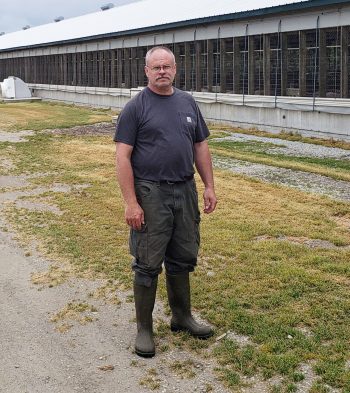Fight Flies with Smart Manure Management
It’s one thing to have some flies around the farm. It’s another to have so many that they buzz around your head incessantly and practically fly into your mouth, if you’re not careful.
“I used to have a terrible fly problem,” said Steve Jaster, who has a 4,000-head swine finishing operation near Medford, Minnesota. “The ceiling in the hog barn would be black, since there were so many flies buzzing around.”

He knew there was a connection between the flies and the solid crusts in his manure pits. “I called those crusts ‘tabletops,’” said Jaster, whose feeder-to-finish swine farm is 1 mile west of the outlet mall in Medford near Interstate 35. “Even if you tried to break them up, they’d just form again and keep floating around in the pit.”
Jaster turned his attention to managing the flies. He tried using fly bait to insecticide sprays. While some products helped a little, the flies always came back in a couple of weeks. He didn’t want the flies at his house, which is north across the road from his swine barns. He also didn’t want the flies to become a problem to the people who live in a mobile home park near his farm.
“I tried everything I could think of, but nothing really worked,” said Jaster, who grew up on his family’s farm near Medford. “I just couldn’t get ahead of the flies.”
As Jaster observed the flies’ lifecycle, two things became clear. “After we washed out the hog barns, maggots would start crawling out of the pit, and then they’d go back. About two weeks later, the flies would become a huge problem.”
When a ProfitProAG sales representative urged Jaster to try Manure Master Plus™, a blend of digestive microbes that enhance manure digestion, he was intrigued. The product helps liquefy the manure, which reduces top crusting and bottom solids. Jaster decided to give it a try. “I could tell that things were getting better as we kept using Manure Master Plus each month.”
Not only did the product eliminate crusting in the pits, but it has controlled the farm’s fly problem, too. “We have a lot fewer flies, and they don’t bother us at our house,” Jaster said.
This became a big factor when the Jasters decided to host their daughter’s high school graduation reception in their garage. “While my wife suggested getting screens for the garage doors to keep out flies, I told her we don’t need to spend money on screens,” said Jaster, who has worked with ProfitProAG for more than a decade. “The flies aren’t a problem anymore.”
How much are flies robbing from you?
Flies are a part of any livestock farm. They assist with the natural decomposition process and are attracted to manure and dead animal carcasses. When a farm isn’t managed properly, however, flies can quickly get out of control.
“Flies have a lifespan of 28 to 30 days,” said Chris Chodur, manure and livestock specialist with ProfitProAG. “On average, flies have an opportunity every two weeks to multiply.”
Flies go down into manure pits to lay their eggs. Pits offer a perfect place for this, since they provide a moist, nutrient-rich environment filled with organic matter. “We see a lot more fly challenges where pits have crusts and a lot of solid matter,” Chodur said.
A rampant fly problem can:
- Damage hog carcasses. When flies bite hogs, it’s irritating and painful for the animals, plus it can cause swelling. Damaged carcasses cost you money. “If the packing plant docks you $14 to $15 per hundredweight, this can cost you $40 to $50 per pig,” said Chodur, a former hog buyer.
- Spread disease. Flies traveling from barn to barn can transmit harmful viruses and pathogens that can make
- pigs sick.
- Cost you money. “Flies can have a negative impact on your animals’ well-being and your farm’s profitability,” Chodur said. “Since we have to live with flies, we have to manage them properly.”
Control pH to manage flies
Many places can harbor flies, including cracks and crevices in building foundations, holes in bulk bins, and weeds and junk around the farm. Proper sanitation can help manage these potential trouble spots.
It’s also important to provide proper ventilation in your hog barns. “It’s a key to your hogs’ health and helps manage flies, since flies don’t like air circulation,”
Chodur said.
Above all, focus on effective manure management. Manure pits with an alkaline pH level are the most prone to fly problems, since insects’ digestive tracts are primarily alkaline. “If you can maintain a slightly acidic pH, it will help you manage a lot of fly problems,” Chodur said.
This requires a pH range of 5.8 to 6.2. Pits that spawn fly problems, however, tend to have a pH range of 7.5 to 8. For new clients facing this situation, Chodur mixes a solution of Manure Master Plus microbes in a low pH (2.8 to 3.1) formulation. “We’ll push 300 gallons through a 2-inch hose and hit all the pumpouts to break up the crust. You’ll see thousands of maggots crawling out of the pumpouts within seconds, because it’s that acidic to
their bodies.”
While this mixture kills most of the maggots, the solution is safe for people and pigs, since it uses organic acidifiers, Chodur added. “It’s great to tell customers, ‘I killed a few thousand potential flies for you today.’”
Fewer flies, fewer worries
Ensuring that the manure won’t crust anymore takes longer, but it will happen when you use Manure Master Plus consistently. If you feed distillers dried grains, pay extra attention to managing solids in your manure pits.
“It takes longer to digest these ingredients and to break them down in the pit,” Chodur said. “This can allow more flies to come in.”
ProfitProAG can formulate the right Manure Master Plus mix for your needs. Totes of the pre-mixed product can be shipped to your farm so you can add the product to the pits yourself. Other farmers prefer to let ProfitProAG handle monthly manure treatments for them.
Jaster appreciates the convenience, while his manure pumping crew likes the results. “They comment on how easy it is to agitate the manure,” Jaster said. “There aren’t solids floating on the top anymore, and there’s no pile of solids that can’t be pumped out of the pits. The more liquid manure you can pump, the better.”
“While Manure Master Plus takes a modest investment of money and time to work, the long-term results are worth it,” Jaster said. “Some farmers are always looking for the cheapest product or a silver bullet to control flies. My advice is to get Manure Master Plus and stick with it. When you manage flies from the start, you have one less thing to worry about.”

